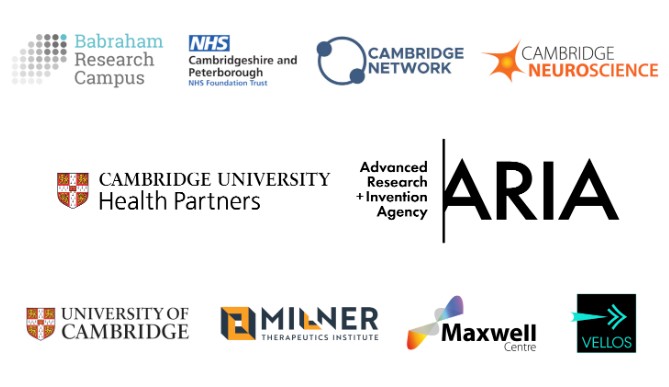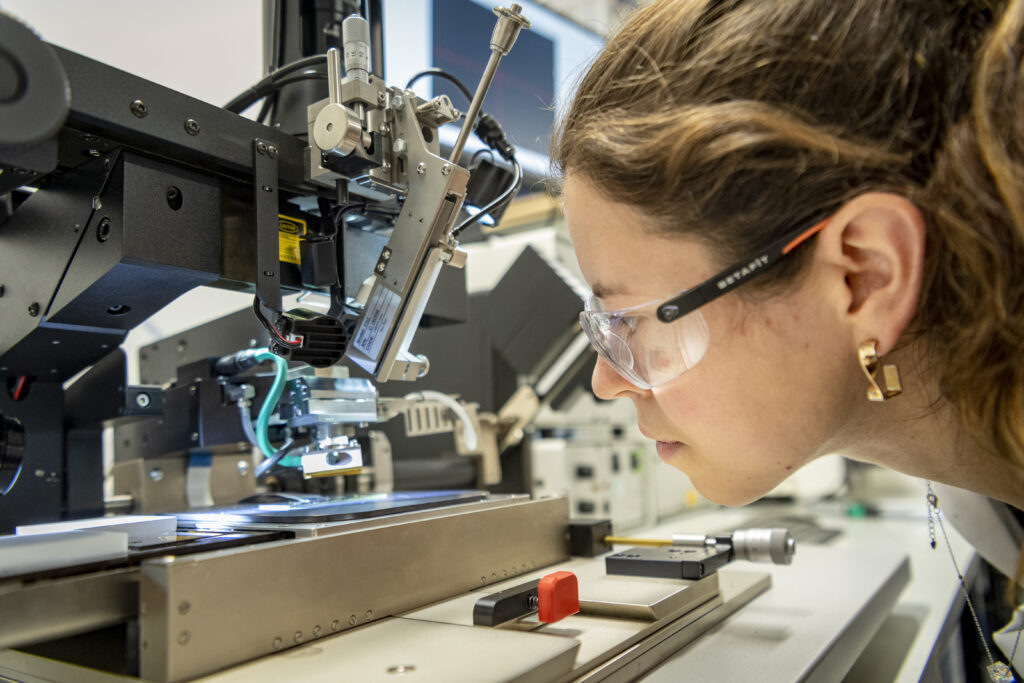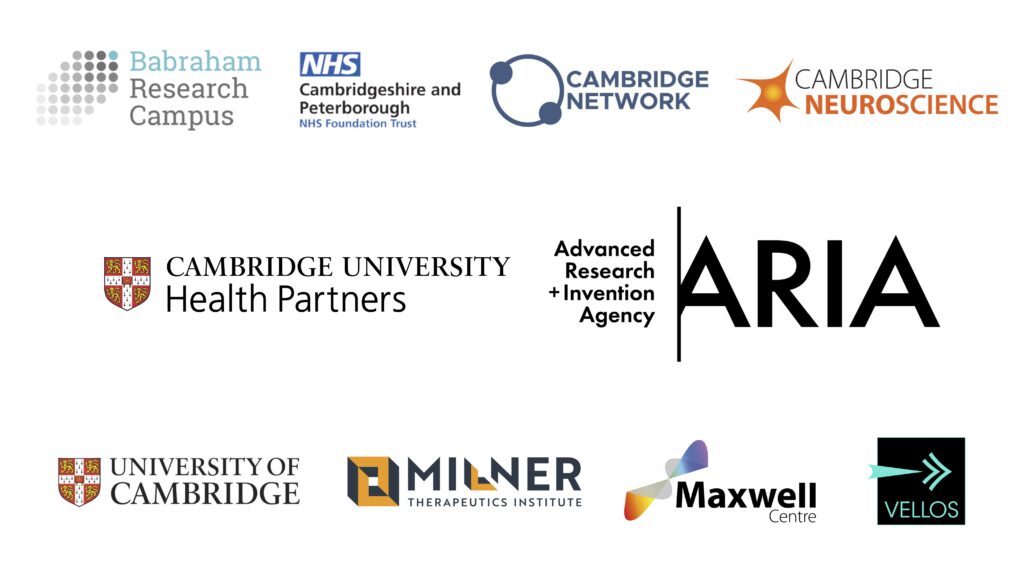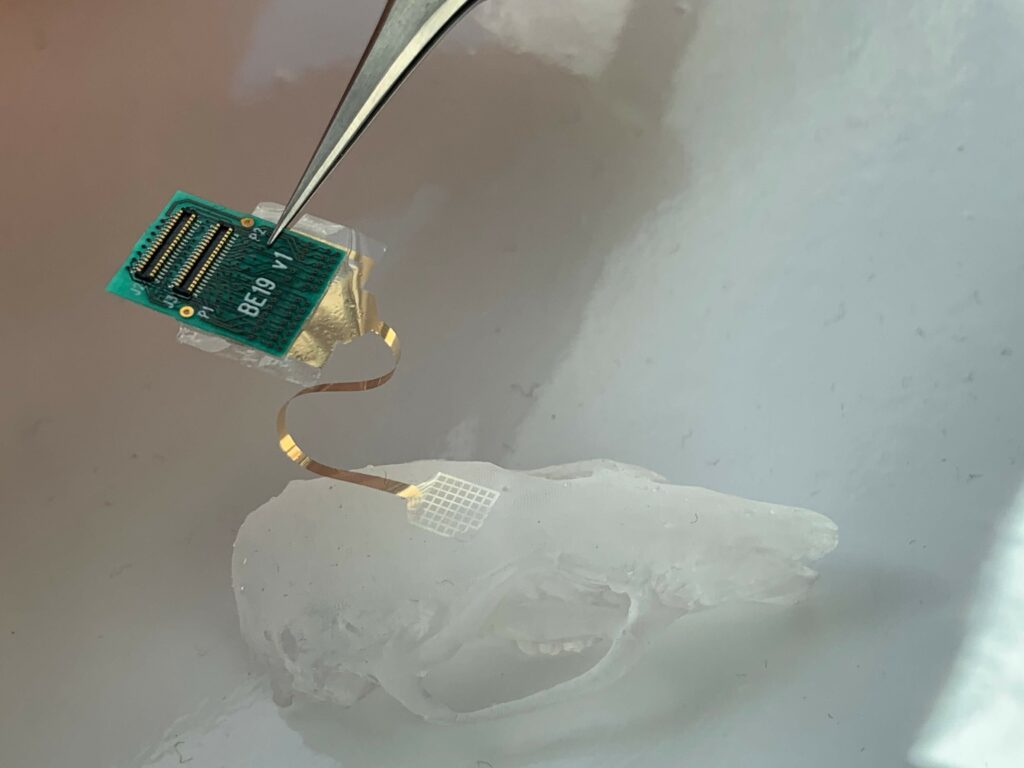

Image credit: Bioelectronics Laboratory, University of Cambridge
Cambridge’s partnership, which includes Cambridge Neuroscience, with ARIA will create a home for original thinkers who are struggling to find the funding, space and mentoring needed to stress-test their radical ideas. It will scour the UK for innovators from any background with a highly ambitious concept for a technology that could transform brain health. The very best will be offered the resources to test and then scale up their idea at pace, so it can be brought to patients across the world quickly and affordably.
Our vision is to unlock more treatments with fewer side-effects, creating a world where personalised brain health care is available to everyone.
Neurological and mental health disorders will affect four in every five people in their lifetimes, and present a greater overall health burden than cancer and cardiovascular disease combined. For example, twenty-eight million people in the UK are living with chronic pain and one point three million people with traumatic brain injury.
Neuro-technology – where technology is used to modulate the nervous system – has the potential to deliver revolutionary new treatments for these disorders, in much the same way that heart pacemakers, cochlear implants and spinal implants have transformed medicine in recent decades. These technologies also have the potential to treat autoimmune disorders, including rheumatoid arthritis, Crohn’s disease and type-1 diabetes.
Original thinking is in the DNA of both ARIA and Cambridge, so this partnership will consider supporting any precise neuro-technology with the potential to solve a global health problem. It could be in the form of electronic brain implants that reset abnormal brain activity or help deliver targeted drugs more effectively, brain-computer interfaces that control prosthetic limbs, new gene therapies, or cutting-edge technologies that train the patient’s own cells to fight disease.
ARIA’s Scalable Neural Interfaces opportunity space is exploring ways to make the technology more precise, less invasive, and applicable to a broader range of diseases.
The science of building technology small enough, precise enough and cheap enough to make a global impact requires an environment where the very best minds from across the UK can collaborate, dream up ambitious ideas and test them without fear of failure. The new partnership is not just for academics, it is open to innovators from all backgrounds and all locations. We want everyone to be able to access our expertise and resources so that they can turn their concepts into mass produced, affordable and clinic-ready technologies to benefit millions of people suffering around the world.
Credit: Joe Troughton (Dept. of Engineering, University of Cambridge)
The three-year partnership is made up of two streams:
Blue Sky Fellows – we will bring together innovators from around the UK with exciting ideas in neuro-technology, and provide the plan and personal skills to translate them. These Blue Sky Fellows will receive funding to rapidly test their idea in Cambridge, along with mentorship from our best medical, scientific and business experts. We will be looking for a very specific type of person to be a Blue Sky Fellow. They must be the kind of character who thinks at the very edge of the possible, who doesn’t fear failure, and whose ideas have the potential to change billions of lives, yet would struggle to find funding from existing sources. Not so much people who think outside the box, more people who don’t see a box at all.
Activator Fellows – this is for those innovators across the UK who have proof of concept validation for their neuro-technology and need support to turn it into a business. They will be offered training in entrepreneurial skills including grant writing, IP management and clinical validation, so that their innovation can be made ready for the next stage in translation.
The Ecosystem Stream is about creating a vibrant, UK-wide neurotechnology community where leaders from business, science, engineering, academia and the NHS can meet, spark ideas and form collaborations. This will involve quarterly events in Cambridge, road trip events across the UK and access to the thriving online Cambridge network, Connect: Health Tech. Innovators will get the opportunity to hyper focus on hypothesis generation, ideation, and experimental pathway design as part of structured “What If” phases, to then test their proof-of-concept ideas in the ‘Blue-Sky’ phase through dedicated discrete funding pots accompanied with access to capabilities and mentorship.
Kristin-Anne Rutter, Executive Director of Cambridge University Health Partners:
“This is an incredibly exciting and unique partnership that is all about turning radical ideas into practical, low-cost solutions that change lives. Cambridge is fielding its best team to make this work and using its networks to bring in the best people from all over the UK. From brilliant scientists to world-leading institutes, hospitals and business experts, everyone in this collaboration is committed to the ARIA partnership because, by working together, we all see an unprecedented opportunity to make a real difference in the world.”
George Malliaras, FRS, Prince Philip Professor of Technology, University of Cambridge:
“Miniaturised devices have the potential to change the lives of millions of people currently suffering from neurological conditions and diseases where drugs have no effect. But we are working at the very edge of what is possible in medicine, and it is hard to find the support and funding to try radical, new things. That is why the partnership with ARIA is so exhilarating, because it will empower us to give brilliant people the tools to turn their original ideas into scalable, commercially viable devices that can have a global impact.”
Dr Ben Underwood, Associate Professor of Psychiatry at the University of Cambridge and Honorary Consultant Psychiatrist at Cambridgeshire and Peterborough NHS Foundation Trust
“Physical and mental illnesses and diseases that affect the brain such as dementia are some of the biggest challenges we face both as individuals and as a society. This funding will bring together different experts doing radical things at the very limits of science and developing new technology to improve healthcare. We hope this new partnership with the NHS will lead to better care and treatment for people experiencing health conditions.”
Dr Dervila Glynn, Strategic Manager at Cambridge Neuroscience at the University of Cambridge
“Already this unique collaboration has been inspirational with the dedication of many participating partners all working towards a common goal. Cambridge Neuroscience is excited to be part of this initiative and will do everything it can to build networks and foster collaborations between all partners and fellows.”

The Milner Therapeutics Institute (MTI) encompasses both a research institute and a global outreach programme, which aims to transform pioneering science into therapies. The MTI is breaking new ground in academic/industry interactions and demonstrates a world-leading model of start-up companies, academics and pharma working side by side at the bench. The Institute houses its own research teams, the Frame Shift Bio-incubator, and the Functional Genomics Screening Laboratory.
The Milner’s in-house research teams focus on target identification and validation through artificial intelligence, machine-learning, functional genomics and the development of human in vitro models. Our aim is to investigate and validate signatures of disease to uncover new high confidence targets for drug discovery.
The Institute is also the global headquarters for the Milner Therapeutics Consortium and Global Alliance, which consists of 82 organisations and connects academia and industry to enable collaborative research. Our events programme is designed to facilitate interactions across this network, and includes an annual Symposium that has grown to over 850 attendees, monthly seminars and bespoke workshops.
The MTI is based at the Jeffrey Cheah Biomedical Centre on the Cambridge Biomedical Campus, which also houses the Wellcome-MRC Cambridge Stem Cell Institute and the Cambridge Institute of Therapeutics Immunology and Infectious Disease (CITIID).
The Maxwell Centre is the centrepiece of academia-industry engagement at the University of Cambridge, actively interfacing leading research in Physical Sciences and Technology with industry and catalysing impactful innovation.
The Maxwell Centre has been driving interdisciplinary interactions and collaborations with companies in Cambridge since 2016, aligning and connecting expertise to co-develop solutions within strategic challenge areas. The current Maxwell Centre Strategy harnesses science and technology to enable a resilient, healthy society of 2051, with a particular focus on Zero Waste and Health Tech.
The University of Cambridge is one of the world’s leading universities, with a rich history of radical thinking dating back to 1209. Its mission is to contribute to society through the pursuit of education, learning and research at the highest international levels of excellence.
The University comprises 31 autonomous Colleges and over 100 departments, faculties and institutions. Cambridge research spans almost every discipline, from science, technology, engineering and medicine through to the arts, humanities and social sciences, with multi-disciplinary teams working to address major global challenges.
A 2023 report found that the University contributes nearly £30 billion to the UK economy annually and supports more than 86,000 jobs across the UK, including 52,000 in the East of England. For every £1 the University spends, it creates £11.70 of economic impact, and for every £1 million of publicly-funded research income it receives, it generates £12.65 million in economic impact across the UK.
The University sits at the heart of the ‘Cambridge cluster’, in which more than 5,000 knowledge-intensive firms employ more than 73,000 people and generate £24 billion in turnover.
Cambridge University Health Partners (CUHP) is one of eight Academic Health Science Centres in England whose mission is to improve patient healthcare by bringing together the NHS, industry and academia. Along with leaders from across the Cambridge life sciences and healthcare ecosystem, CUHP devised and now implements the life science strategy for the Cambridge region. The partners are, Anglia Ruskin University (ARU), Cambridge and Peterborough NHS Foundation Trust, Cambridge University Hospitals NHS Foundation Trust, Royal Papworth Hospital NHS Foundation Trust and the University of Cambridge.
Cambridge Network is a not-for-profit membership organisation that brings people together from business and academia to exchange ideas, foster collaboration and build partnerships for shared success. Through networking, events, training and recruitment services, it connects and supports businesses, sparking collaboration within its vibrant network of members. Based on its strong position as a key partner in the Cambridge ecosystem, and its connections outside of the region, Cambridge Network will act as a catalyst in building a new network which will bring multi-disciplinary academic, clinical and industry partners, from across the UK, to the project.
The Babraham Research Campus is a leading location which supports early-stage bioscience enterprise and is distinct in its co-location of bioscience companies with the world leading discovery research of the Babraham Institute. Our Campus is a dynamic environment within 430 acres of parkland, home to over 60 companies, 2,000 employees and 300 academic researchers. It is where discovery research and business come together with a shared scientific focus that accelerates innovation and strengthens links between academia and the commercial world.
Cambridgeshire and Peterborough NHS Foundation Trust (CPFT) is a health and social care organisation, providing integrated community, mental health and learning disability services, across Cambridgeshire and Peterborough, and children’s community services in Peterborough. We support a population of just under a million people and employ nearly 4500 staff. Our largest bases are at the Cavell Centre, Peterborough, and Fulbourn Hospital, Cambridge, but our staff are based in over 50 locations. We are a University of Cambridge Teaching Trust and member of Cambridge University Health Partners, working together with the University of Cambridge Clinical School and Anglia Ruskin University. Together with global, national and local partners we conduct high-quality and ground-breaking research into mental and physical health and support innovation to improve patient care.
Vellos, co-founded by Prof Sir Tony Kouzarides – who also co-founded Abcam and the Milner Therapeutics Institute – is dedicated to advancing life science innovation through company creation. It promotes impact at research institutions by empowering entrepreneurship and drives innovation through the creation of world-class ventures.
Cambridge Neuroscience is a virtual Interdisciplinary Research Centre at the University of Cambridge. It serves to connect ~900 neuroscientists across all 6 schools of the university with membership spanning more than 30 Departments and affiliated institutions. Cambridge Neuroscience connects people, facilitates interdisciplinary research, and supports the University’s mission, which is to contribute to society through the pursuit of education, learning and research at the highest levels of excellence. Cambridge Neuroscience works by removing traditional boundaries between basic and translational neuroscience, and nurturing collaborations across research disciplines. Our key strength in Cambridge Neuroscience remains our people: first class researchers from a wide range of backgrounds and expertise working in everything from biomedicine and maths, to psychiatry and philosophy, education, engineering and economics.
ARIA is an R&D funding agency created to unlock technological breakthroughs that benefit everyone. Created by an Act of Parliament, and sponsored by the Department for Science, Innovation, and Technology, we fund teams of scientists and engineers to pursue research at the edge of what is scientifically and technologically possible.

Image credit: Bioelectronics Laboratory, University of Cambridge
Posted on 09/10/2024